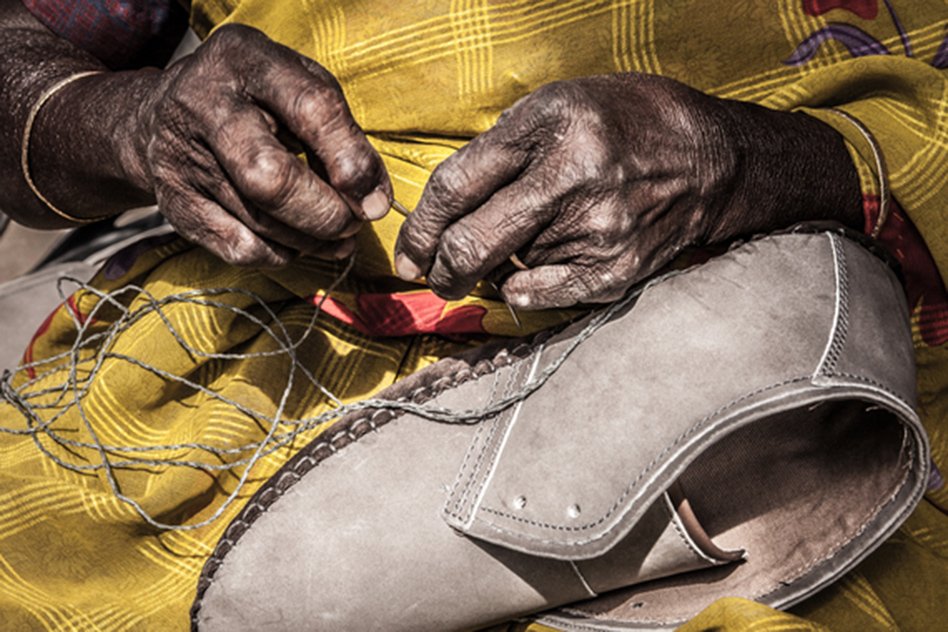
For Your Thousand Rupee Shoe, Women Workers In Tamil Nadu Are Paid Only Rs 5
4 May 2016 8:52 AM GMT
Editor : Richa Verma Verma
I have done my graduation and post graduation in English Literature from Miranda House, Delhi University. Writing is my passion and I believe words have immense power which can shape the thoughts of an individual as well as the nation.
Imagine a middle aged woman in a rural household in India who cannot step out of her house due to domestic chores, getting up at the crack of dawn to cook and clean and going to bed past midnight. She has to take care of her husband, her children and is the traditional caretaker of her in-laws. That is her gendered role in the family.
In addition, she has to be the sole breadwinner for the family. She is bent double over a shoe, screwing her eyes to focus on the needle stitching it, and trying hard to stop her hands from shivering. A machine cannot compete with the skill of the hands. With all that concentration she somehow manages to manufacture a pair of shoes in about an hour. At the most she is able to produce 16 pairs in a day if she is lucky.
In return she earns a meager sum of Rs 5 per pair from the middleman who negotiates with sub-contractors hired by international brands, mainly based in the UK. Thus, she is doubly removed from the owners of such companies. The shoes are globally sold in high-end show rooms or online portals for as much as Rs 7,500 a pair.
However, she knows that there is no dearth of labour in the market and she can easily be replaced even if she haggles for a rupee or two more. “We cannot negotiate with the middleman because the middleman knows many people who really need and want a job. So if I negotiate for one rupee or two rupees…They will give (the work) to some other area,” says one such woman.
If she is fortunate she may get Rs 6 for a pair, but that is an exception rather than the rule. With rice costing Rs 50 a kg, we can well imagine how difficult it would be to get two square meals a day for a traditional rural joint family. Having no alternative source of income and solely dependent on the middlemen, who are well aware of their vulnerability and the surplus labour, they have no choice but to accept what is given to them.
We are not spinning a yarn. This anonymous woman can be given any name that we want, but that name is hardly able to give her an identity in the unorganized sector of Indian industry. She remains just that, anonymous, a hand in the labour market with no job security, nothing close to minimum wage, no medical benefits and of course no legal stand. She is not even registered as a worker by the organizations which employ her and, hence, remains invisible.
The upper part of the shoes is what requires the most skill, but in return this woman can court skin diseases, rashes, eye infections, and numbness in hands, chest pains, and breathing trouble due to inhalation of dust from the tanned leather, which is sometimes infected with germs and laced with hazardous chemicals. The most-labour intensive part of the manufacturing process makes her susceptible to diseases. However, the parent organization is not ready to take any responsibility for her condition. Since she has two levels of intermediaries between her and the organization – the village middle man and the sub contractors – she is not an “official” employee of the company.
This is the impoverished and sad plight of women from a cluster in Tamil Nadu, including Vellore and Ranipet, who remain hidden in the supply chain of global footwear industry. They bear testimony to the harsh realities of post-colonial imperialism which still exploits resources from across the world. The developed countries still dictate the factor prices in today’s world. Third world countries, like Bangladesh and India, or in Africa and Latin America, may have received independence, but the fruits of freedom are not tasted by such women, who remain one of the most vulnerable sections of contemporary India. They are mere cogs in the wheel of “sweetshops” in such countries which manufacture the products which bear the logo of international brands like Nike – oppressed, suppressed and muted.
India is the eighth-largest exporter of leather footwear in the international market, with each pair being sold for a sum amounting between 40 and 100 Euros (Rs 2000-7500) in UK markets. Last year, this global business produced over 24 billion pairs. However, women who actually toil to make those shoes never get to see even a fraction of the money that is earned for the end product. That of course is pocketed by the owners of the business while the woman might receive as little as Rs 150 a day, amounting to Rs 4, 500 a month, often even lesser. Plus, even if they finish today’s work satisfactorily, there is no guarantee that they will have the same amount of work the next day. While those organizations earn profits in millions, these women can even face disasters like the 2013 Rana Plaza factory (a sweatshop) collapse in which over 1,130 workers were killed. Result? The sole breadwinner of the family gone and the bereaved are left to die of hunger.
Such a circumstance is equivalent to the condition of factory workers during the Industrial Revolution in the Western countries more than a century ago. It is horrifying that women in India today have to face a worse predicament in 2016. This calls for urgent rectification of the unfair trading practices of the footwear industry which spawns the global network.
This does not mean knee-jerk reactions by parent organizations, which may ban employing home-makers in the supply and production chain. That would kill the households, or worse still, push those women further into the shadows with worse fates at the hands of middlemen. What is needed is transparency in the shoe industry, and public mapping of their supply chains so that these women are acknowledged as an integral and central part of the manufacturing process. Their proper registration, annual appraisal and audit reports would ensure that the women get the minimum wages, socio-economic and legal claims and a bare amount of health facilities. A safety net should be provided so that they are not exploited by the middlemen and sub-contractors. Only that would ensure proper justice to the back-breaking labour which comprises the global footwear industry.
The Logical Indian community is appalled at such inhuman treatment of the most important people in the manufacturing process of one of the most thriving businesses of the world! We urge the government of Tamil Nadu, central government and the parent organizations to initiate the procedure required to streamline the supply chain urgently so that these “invisible labourers” get a modicum of dignity and security.
 All section
All section













